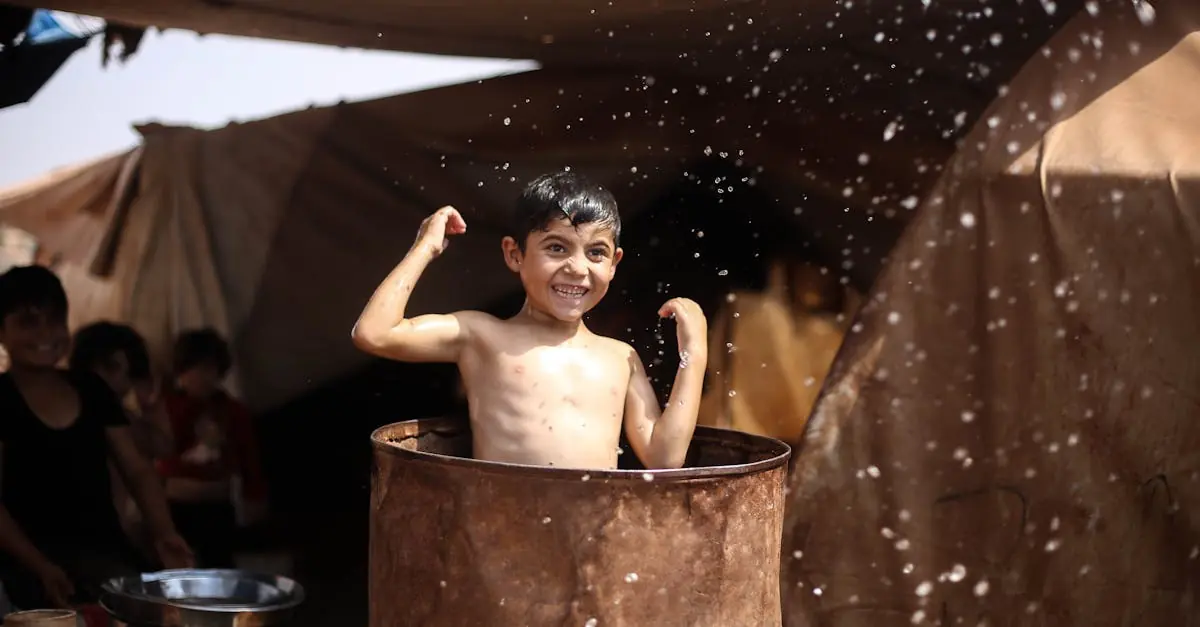Summer camp isn’t just for roasting marshmallows and perfecting the art of the cannonball. For kids with ADHD, it’s a chance to thrive in an environment that understands their unique needs. Imagine a place where energy is celebrated, creativity is unleashed, and distractions are kept at bay. That’s the magic of summer camp tailored specifically for these kids.
Table of Contents
ToggleOverview of Summer Camp for Kids With ADHD
Summer camps specifically designed for children with ADHD offer a dynamic environment tailored to their needs. These camps emphasize an understanding of ADHD characteristics, creating programs that are engaging and accommodating. Kids participate in activities that capitalize on their strengths, such as creativity and boundless energy.
The structure of daily routines provides consistency, allowing children to navigate their schedules with confidence. Staff members trained in ADHD management employ techniques to promote focus and participation. They incorporate varied activities, ensuring that each child can find areas where they excel.
In addition to physical activities, camps foster social skills through team-building exercises. Children learn to cooperate, communicate, and create meaningful friendships. This social interaction is crucial for developing empathy and understanding among peers.
Safety and emotional support play vital roles in these camps. A focus on inclusivity helps children feel accepted and valued. Counselors closely monitor interactions, promoting positive behaviors and addressing challenges as they arise. These efforts cultivate a nurturing atmosphere where kids can thrive.
Parents often notice improvements in their children’s self-esteem and coping skills after attending camp. The experiences gained contribute to personal growth, enabling better management of ADHD symptoms. Camps can serve as a stepping stone for lifetime friendships and skills development, transforming challenges into opportunities for growth.
Benefits of Summer Camps
Summer camps tailored for children with ADHD offer numerous advantages. They create opportunities for growth in various areas, enhancing both social and academic skills.
Social Skills Development
Social skills development stands out as a key benefit. These camps use team-building exercises to encourage cooperation among peers. Children learn to communicate effectively during group activities. Campers often engage in role-playing games that promote understanding and empathy. Moreover, shared experiences build meaningful friendships, fostering a sense of belonging. As kids practice interaction in a supportive environment, they gain confidence in navigating social situations. Improved social skills can lead to better relationships both inside and outside the camp setting.
Structured Environment
A structured environment plays a crucial role in supporting children with ADHD. Camps implement daily routines that provide familiar schedules and reduce distractions. Consistency in activities helps children adjust and focus throughout the day. Daily schedules often include diverse activities that keep campers engaged, catering to their need for variety. Trained staff use techniques to maintain attention, such as hands-on learning experiences. By establishing clear expectations, children thrive under structure and develop essential life skills. This organized atmosphere not only promotes learning but also fosters a sense of safety and security.
Types of Summer Camps for Kids With ADHD
Camps for kids with ADHD come in various formats that cater to different needs and preferences. Parents can choose from traditional day camps or specialized ADHD camps, each providing valuable experiences for children.
Traditional Day Camps
Traditional day camps often feature a range of activities suited for different interests. Structured routines are common, allowing for predictability and security. Trained staff members help monitor interactions, promoting positive social experiences. Activities include arts and crafts, sports, and group games, supporting both creativity and physical engagement. Campers often learn to work together, enhancing cooperation. These settings allow children to develop friendships while enjoying diverse experiences tailored to their abilities.
Specialized ADHD Camps
Specialized ADHD camps focus explicitly on children with ADHD, emphasizing tailored support and understanding. Staff members are trained to recognize challenges unique to ADHD, guiding campers through activities designed for engagement and focus. Camps often incorporate sensory-friendly spaces and strategies to minimize distractions. Social skills training is a critical component, with role-playing exercises and team initiatives providing real-life experiences. Kids gain confidence through structured opportunities for interaction, allowing them to cultivate meaningful connections with peers. Special programs often emphasize emotional regulation and personal growth, equipping children with essential skills for their future.
Choosing the Right Camp
Selecting the appropriate summer camp for children with ADHD requires careful consideration. Various factors shape this decision, making it crucial to find a camp that fosters growth in a nurturing environment.
Factors to Consider
Age range significantly influences camp choice. Camps that cater to specific age groups provide appropriate activities and support. Staff expertise plays a key role; trained personnel familiar with ADHD can create engaging experiences that promote focus. Safety protocols ensure the well-being of campers, offering parents peace of mind. Program structure matters; camps with consistent daily routines enhance adjustment and reduce distractions. Lastly, the ratio of staff to campers affects personalized attention, allowing for tailored support and building meaningful relationships.
Questions to Ask Camp Organizers
Questions directed at camp organizers reveal essential information. Inquire about staff training related to ADHD management and intervention techniques. Understanding the daily schedule helps gauge the structure of activities. Assess how the camp implements social skills training; this aspect fosters important peer interactions. Explore how the camp adapts activities for different needs, promoting inclusivity among children. Ask about communication methods with parents, ensuring a collaborative approach to support. These inquiries equip parents to make informed decisions for their children’s camp experience.
Preparing Your Child for Camp
Preparing a child for summer camp entails thoughtful planning and open communication. Parents play a crucial role in this process, ensuring their children feel supported and ready for the experience.
Communication Strategies
Effective communication serves as a foundation for a positive camp experience. Discussing the camp’s schedule and activities provides children with insight into what to expect. Highlighting specific activities can spark excitement. Utilizing visual aids helps children better understand their daily routines and transitions. Regular check-ins empower children to express their feelings and any concerns. Sharing personal experiences of camp, even from other children, can also encourage a sense of belonging and enthusiasm.
Setting Expectations
Setting clear expectations lays the groundwork for a successful camp adventure. Explain what behaviors are appropriate and how to handle challenges that may arise. Practicing skills like asking for help or making new friends supports social development. Establishing goals for the camp experience can give children targets to aim for, such as trying a new activity or making a friend. Encouraging flexibility helps children adjust to new situations while reinforcing that it’s okay not to excel at everything. Acknowledging both feelings of excitement and apprehension can foster a healthy understanding of camp life.
Summer camp offers a unique opportunity for children with ADHD to grow and thrive in a supportive environment. These camps not only cater to their specific needs but also promote social skills and personal development in a structured setting. Parents can witness significant improvements in their children’s confidence and coping abilities as they engage in activities designed to enhance focus and cooperation.
Choosing the right camp is crucial for ensuring a positive experience. With careful consideration of each camp’s offerings and the child’s individual needs, parents can help their children embark on a journey of growth and friendship. Ultimately, summer camp can transform challenges into stepping stones for lifelong success.






